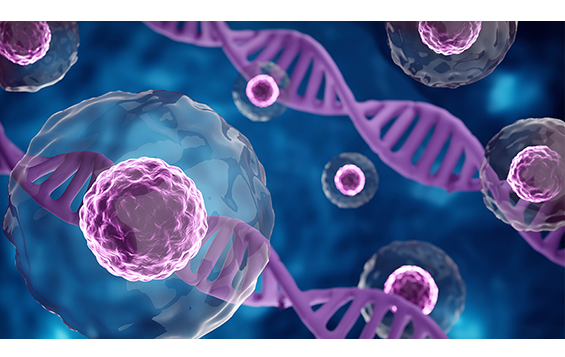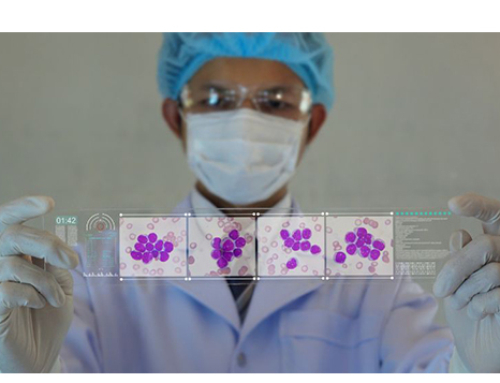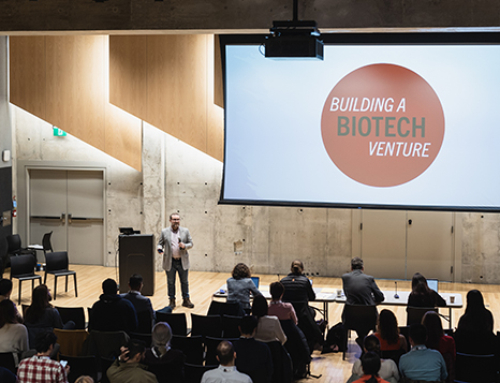
Mutations in stem cells that give rise to blood cells can lead to various health issues, such as clonal hematopoiesis (CH). Scientists at UHN explored whether metformin, a drug commonly used to treat high blood sugar levels in diabetes, could also be used to treat CH.
This story is reprinted from UHN Research. Medicine by Design supported this research through its Team Project Awards.
A new study published in Nature by Steven Chan’s team at the Princess Margaret Cancer Centre (PM) suggests that metformin, a drug used to treat diabetes, may help prevent the expansion of mutant blood stem cells (hematopoietic stem cells, HSCs) linked to clonal hematopoiesis (CH), a condition associated with several illnesses, including blood cancer.
HSCs are immature cells that can develop into different types of blood cells. In CH, these stem cells acquire mutations that cause the abnormal expansion of the mutated cells. CH is linked to an increased risk of blood cancers, heart disease, and age-related inflammatory conditions such as chronic liver and kidney disease. Although suppressing the expansion of mutant HSCs may help prevent these health issues, no approved treatments are currently available.
The most common mutation in CH affects a gene called DNMT3A, which produces a protein, DNA methyltransferase, that helps regulates gene expression through a process known as DNA methylation. A specific mutation in this gene, DNMT3A-R882, is linked to a significantly higher risk of developing acute myeloid leukemia (AML), making it an important target for preventive intervention.
To better understand how this mutation works, the researchers used experimental models with an equivalent mutation to DNMT3A-R882. They discovered that cells with this mutation have higher metabolic activity than normal (wild-type) cells, which gives them a competitive advantage.
Metformin, a commonly used diabetes medication, works by inhibiting a protein called Complex I, which is involved in metabolism and energy production. Due to its effect on cellular metabolism, the team tested whether metformin could reduce the competitive advantage of mutant cells.
Through lab-based models, the researchers found that treatment with metformin reduced this competitive advantage. Advanced sequencing techniques also showed that metformin increased DNA and histone methylation potentials in mutant cells, helping to counteract the effects of the mutation and modify the activity of metabolism-related genes.
“Observing these metabolic changes in mutant cells marks the first time this feature has been demonstrated in CH,” adds Dr. Mohsen Hosseini, first author of the study. “This study is also among the first to reveal the crucial interplay between metabolism and DNA modification in CH, highlighting that these interactions can induce reversible changes to cellular characteristics.”
“These findings are significant because they suggest that metformin could be used as a preventative treatment for people with CH with DNMT3AR882 mutations,” says Dr. Steven Chan, Senior Scientist at PM and senior author of the study. “More research and clinical trials are needed to investigate this further.”
The first author of this study is Mohsen Hosseini, a Scientific Associate at the Princess Margaret Cancer Centre.
The senior author of this study is Steven Chan, a Senior Scientist at the Princess Margaret Cancer Centre and an Associate Professor in the Department of Medical Biophysics at the University of Toronto.
The following UHN Principal Investigators are co-authors of the study: Federico Gaiti, Scientist at PM; Aaron Schimmer, Director of PM, Gary Bader, Affiliate Scientist at PM; John Dick, Senior Scientist at PM, and Stephanie Xie, Scientist at PM.
The following Investigators from other Toronto Institutions are co-authors of the study: Shraddha Pai, Principal Investigator at the Ontario Institute for Cancer Research; Grace Egan, Clinician-Scientist at the Hospital for Sick Children.
This work was supported by The Princess Margaret Cancer Foundation, the University of Toronto’s Medicine by Design, the Leukemia Research Foundation, the Canadian Institutes of Health Research, the Canadian Cancer Society, the Terry Fox Research Institute, and the Ontario Ministry of Health.
Steven Chan has received research funding from the Centre for Oncology and Immunology in Hong Kong, Celgene/BMS, AbbVie Pharmaceuticals, Agios Pharmaceuticals, and Servier Laboratories. For additional competing interests, see the manuscript.
Hosseini M, Voisin V, Chegini A, Varesi A, Cathelin S, Manikoth Ayyathan D, Liu ACH, Yang Y, Wang V, Maher A, Grignano E, Reisz JA, D’Alessandro A, Young K, Wu Y, Fiumara M, Ferrari S, Naldini L, Gaiti F, Pai S, Egan G, Schimmer AD, Bader GD, Dick JE, Xie SZ, Trowbridge JJ, Chan SM. Metformin reduces the competitive advantage of Dnmt3aR878H HSPCs(link is external). Nature. 2025 Apr 16. doi:10.1038/s41586-025-08871-w.


